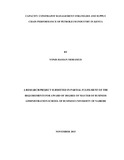| dc.description.abstract | Operational research methods have being used to support day-by-day decisions for batch
sizing and job sequencing problems, while what-if analysis has being adopted as a
decision support system in the field of supply chain. This study aimed to investigate the
capacity constraint management strategies and supply chain performance of petroleum
industry in Kenya and to determine the relationship between capacity constraint
management strategies and supply chain performance of petroleum industry in Kenya.
The study was guided by theory of constraints and the theory of supply chain
management. the study adopted a descriptive cross-sectional research design which was
used to establish the relationship between capacity constraint management strategies and
supply chain performance in Kenyan petroleum industry. The target population included
55 oil marketing companies in Kenya. Primary data was collected by means of a semistructured questionnaire. The questionnaires was self-administered via drop and pick later
method to the respective departments in Kenya Pipeline Company, Energy Regulation
Commission and the Ministry of Energy. The data collected was analysed using
descriptive statistics (measures of central tendency and measures of variations) and
regression analysis to achieve the objectives of the study. The dependent variable in the
study was supply chain performance. The independent variables for the study include the
various capacity constraint management strategies used by firms in the Kenyan petroleum
industry, among them: Inventory Planning Strategy, Price Control Strategy, Order
Management Strategy, Material Planning Strategy and Market Readiness Strategy. the
study found a positive correlation coefficient between inventory planning strategies and
supply chain performance of petroleum industry in Kenya. The study further revealed
that companies that use the inventory planning strategies, produce only enough goods to
meet or exactly match the demand for goods. The study further found a positive
correlation coefficient between price control strategy and supply chain performance of
petroleum industry in Kenya. The study further revealed that it costs a firm money to
keep supplies and inventory in a warehouse. A positive correlation coefficient between
order management strategy and supply chain performance of petroleum industry in
Kenya was revealed. The study further found that order management strategies improves
customer loyalty. On material planning strategy, the study revealed that material planning
strategy influences supply chain performance of petroleum industry in Kenya positively.
The study further revealed that the material planning strategy contains targeted sales
forecasts, production levels, inventory levels, and customer backlogs. The study found
that market readiness strategy was found to have a positive correlation coefficient on
supply chain performance of petroleum industry in Kenya. Supply chain performance
measures have a significant impact on supply chain performance of petroleum industry in
Kenya. The study recommends that oil marketing companies in the petroleum industry
need to take the capacity constraint management strategies idea a step further to
collaborate with competitors so as to find shared solutions to their supply chain
management challenges. | en_US |

